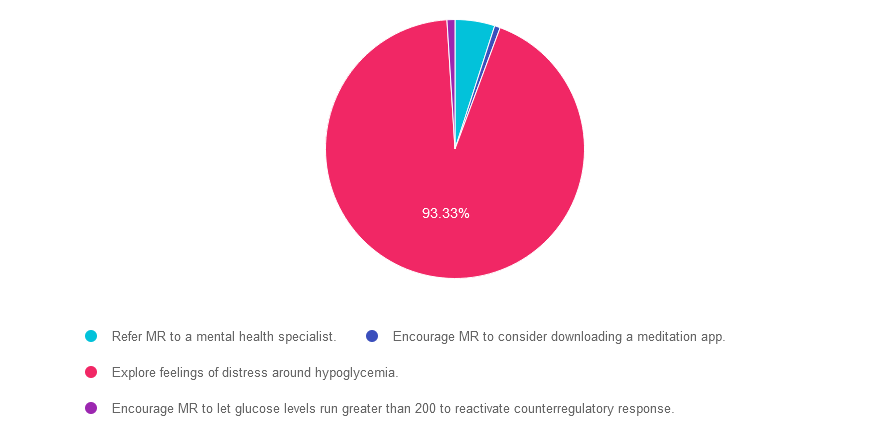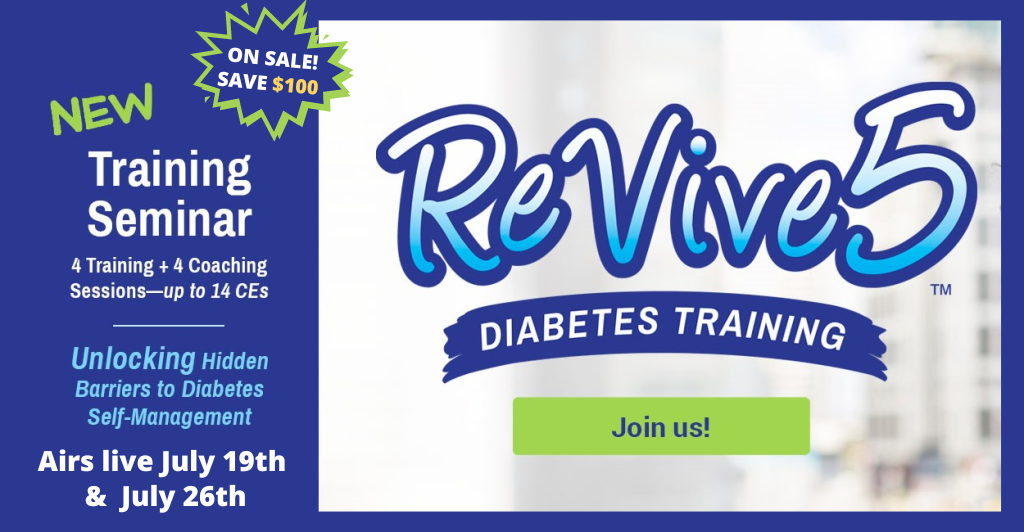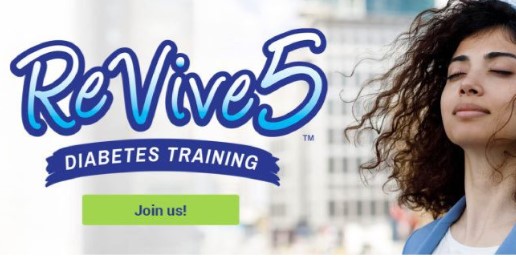
For last week’s practice question, we quizzed participants on patient-centered care for hypoglycemia. 93% of respondents chose the best answer. We want to clarify and share this important information, so you can pass it on to people living with diabetes and your colleagues, plus prepare for exam success!
Before we start though, if you don’t want any spoilers and haven’t tried the question yet, you can answer it below: Answer Question
Question:
During your visit, you discover that MR is struggling with diabetes distress, especially around their fear of low blood sugar.
Which of the following is the most appropriate intervention?
Answer Choices:
- Refer MR to a mental health specialist.
- Encourage MR to consider downloading a meditation app.
- Explore feelings of distress around hypoglycemia.
- Encourage MR to let glucose levels run greater than 200 to reactivate counterregulatory response.

Getting to the Best Answer
If you are thinking about taking the certification exam, this practice test question will set you up for success. Test writers anticipate possible answers based on the details in the question. They will wave those “juicy answers” right under your nose. Your job is to weed through the particulars, pluck out the most important elements and choose the BEST answer.
Answer 1 is incorrect. 4.69% chose this answer. “Refer MR to a mental health specialist.”
Although this answer is tempting, based on the information provided, MR doesn’t necessarily need to be referred to a mental health specialist. We expect that people with diabetes will have some degree of distress around fear of hypoglycemia. However, we can explore it further with MR and help with problem-solving to prevent hypoglycemia and make sure they have appropriate treatment strategies. If this is not successful, and MR still has on going distress, then we could consider referral to a mental health specialist with knowledge about diabetes management.
Answer 2 is incorrect. 0.71% of you chose this answer. “Encourage MR to consider downloading a meditation app.” It is true that meditation can be very helpful for people needing to decrease their stress levels. However, MR is dealing with a specific type of distress, resulting from fear of hypoglycemia. This generalized approach of suggesting a meditation app doesn’t acknowledge the distress MR is feeling specifically around hypoglycemia. Since it is not a person-centered approach, it is not the best answer.
Answer 3 is correct. About 93.33% of respondents chose this. “Explore feelings of distress around hypoglycemia.” Great job. Most of you chose this best answer! Hypoglycemia distress is real and helping people with problem-solving to prevent hypoglycemia, explore their feelings and fears, and make sure they know appropriate treatment is the best first approach. If that is not successful, referral to a mental health specialist might be indicated.
Finally, Answer 4 is incorrect. 0.99% chose this answer. “Encourage MR to let glucose levels run greater than 200 to reactivate counterregulatory response.” While it is true that people who have hypoglycemia unawareness can increase their feelings of low blood sugar by allowing their blood sugars to run a little higher, this response does not address the emotional distress MR is feeling. Plus, there is no mention that MR has hypoglycemia unawareness. For that reason, it is not the best answer.
We hope you appreciate this week’s rationale! Thank you so much for taking the time to answer our Question of the Week and participate in this fun learning activity!
Want to learn more about this question? Join our NEW
ReVive 5 Diabetes Training Program
Live Virtual Sessions July 19 & July 26th – Save $100

Whether you are a novice or an expert in providing diabetes care, we invite you to attend this exciting training program that provides the essential steps to address diabetes distress combined with an innovative approach to glucose management that will revolutionize your practice.
“ReVive 5” breathes new life into our relationship with diabetes, bringing a fresh perspective to both the person with diabetes and the provider.
Join A Team of Experts

Team of Experts: ReVive 5 is taught by a team of 3 Interdisciplinary Experts:
- Lawrence Fisher, Ph.D., ABPP, Professor Emeritus, UCSF
- Susan Guzman, PhD
- Beverly Thomassian, RN, MPH, CDCES, BC-ADM
Accredited Training Program:
- 14.0 CEs – Includes the 7-hour Session ReVive 5 Training Program, Certificate, and 5 FREE bonus courses to supplement content.
- A comprehensive set of assessment tools, educational materials, log sheets, and resources.
Dates and Times for ReVive Virtual Training
- For your convenience, we have combined the 4 sessions into 2 half days. Same great content.
- July 19 and 26th from 9 am to 12:30 pm PST. Space is limited, so save your space today!
Speakers Interviews – Learn more about the ReVive 5 Team
What is the Biggest Takeaway when Addressing Diabetes Distress? – Dr. Susan Guzman
Do you have to be a Mental Health Expert to Tackle Diabetes Distress? – Dr. Lawrence Fisher
Why I Transformed my Approach to Diabetes Self-Management Education- Coach Beverly
Don’t worry if you can’t make it live. Your registration guarantees access to the recorded version in the Online University.
All hours earned count toward your CDCES Accreditation Information
Sign up for Diabetes Blog Bytes – we post one daily Blog Byte from Monday to Friday. And of course, Tuesday is our Question of the Week. It’s Informative and FREE! Sign up below!
The use of DES products does not guarantee the successful passage of the CDCES exam. CBDCE does not endorse any preparatory or review materials for the CDCES exam, except for those published by CBDCE.









